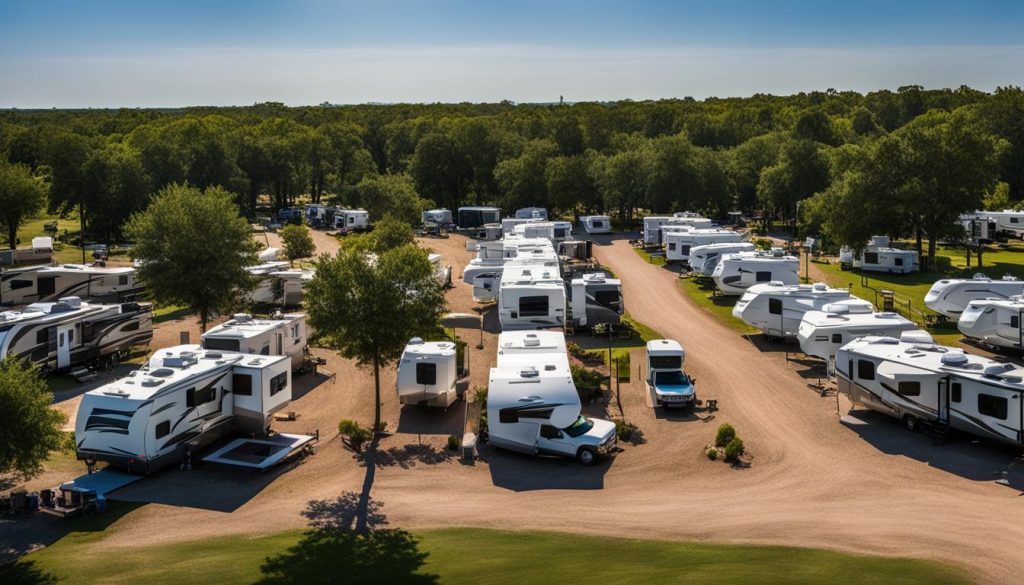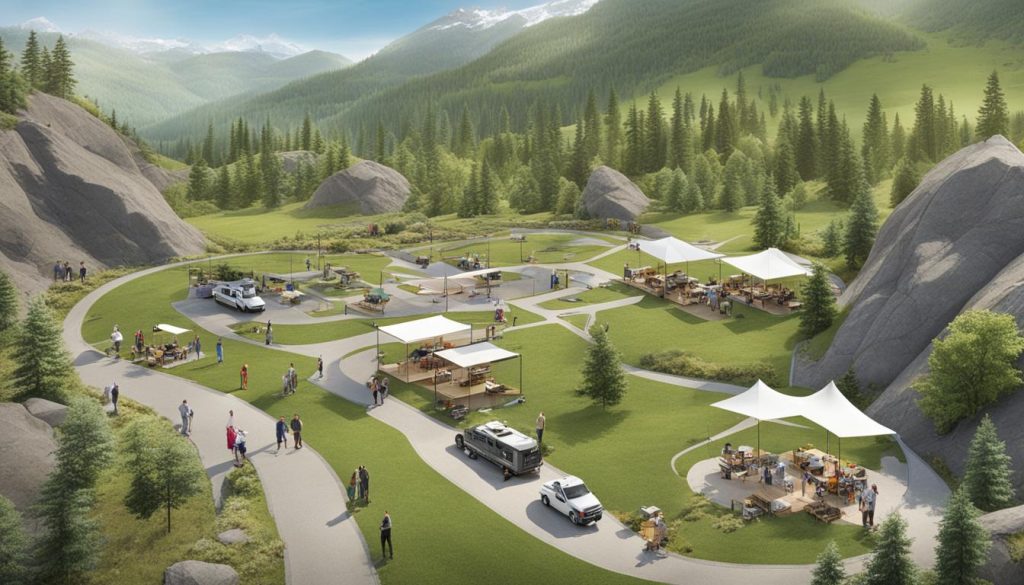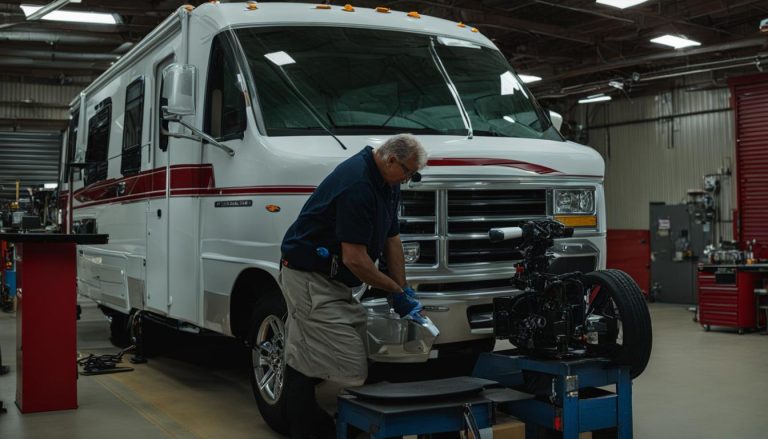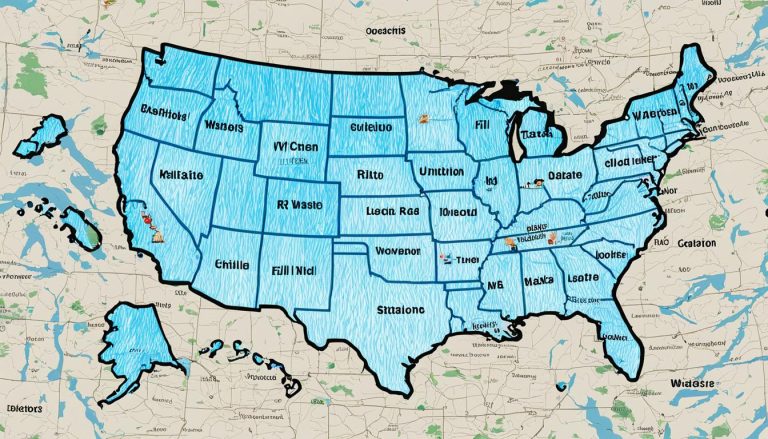Starting an RV Park in Texas: Your Quick Guide
gorvlifestyle.com and its partners may earn a commission if you purchase a product through one of our links
If you’re considering starting an RV park in Texas, you’re embarking on an exciting venture in a state with diverse landscapes, a favorable climate for year-round camping, and a thriving economy. However, it’s important to be aware of the unique challenges that come with building and running an RV park in Texas. From navigating zoning and licensing regulations to finding ideal land at competitive prices, and from standing out in a competitive market to effectively managing resources, there’s a lot to consider.
In this quick guide, we’ll explore the essential steps and strategies for starting and managing an RV park in Texas. We’ll cover everything from understanding Texas RV park regulations and permits to pinpointing the perfect location, creating a solid business plan, securing financing, and implementing effective marketing strategies.
Along the way, we’ll highlight the reasons why Texas is an ideal location for RV parks, as well as the unique challenges you may encounter and the strategies to overcome them. By the end of this guide, you’ll have a comprehensive understanding of what it takes to successfully start and manage an RV park in the Lone Star State.
Key Takeaways:
- Understand Texas RV park regulations and permits
- Consider the diverse landscapes and favorable climate of Texas as advantages for RV park businesses
- Navigate challenges such as finding ideal land, staying competitive, and managing resources
- Collaborate with local experts, invest in infrastructure, and adopt sustainable practices
- Embrace digital marketing strategies to attract guests and optimize online presence
Why Texas is Ideal for RV Parks
Texas offers a unique and diverse experience for RV travelers with its geographical diversity, ranging from sandy deserts to lush pine forests. Whether you’re seeking breathtaking sunsets over rolling hills or tranquil lakeside retreats, Texas has it all. The state’s warm temperatures and mild winters create a favorable climate for year-round camping, making it an enticing destination for RV enthusiasts.
But it’s not just the picturesque landscapes that make Texas an ideal location for RV parks. The state’s growing economy and favorable business environment provide a solid foundation for entrepreneurs aiming to establish and grow their RV park venture.
With a booming tourism industry and a robust economy, Texas offers a thriving market for RV parks. From families embarking on summer road trips to retirees seeking adventure, there is a constant demand for quality RV park facilities. As an RV park owner, you can tap into this growing market and cater to the diverse needs and preferences of travelers.
Furthermore, Texas’s business-friendly policies and favorable regulations create an environment that supports and encourages the establishment of RV parks. Navigating the necessary permits and regulations can be a relatively straightforward process, allowing you to focus on creating an exceptional experience for your guests.
So, whether you’re seeking a place to unwind amidst scenic landscapes or a lucrative business opportunity, Texas offers the perfect combination of favorable climate, a growing economy, and a business-friendly environment for RV parks.
Challenges Faced When Building an RV Park in Texas
Building an RV park in Texas comes with its fair share of challenges and considerations. In order to successfully establish and run your own RV park, you need to be prepared to navigate various hurdles, including:
1. Texas RV Park Regulations
One of the main challenges you will encounter is understanding and complying with the specific zoning and licensing regulations in Texas. These regulations can be complex and require you to adhere to local zoning laws. It is crucial to research and consult with local authorities and experts to ensure that your RV park is in compliance with all the necessary regulations.
2. Securing Ideal Land at Competitive Prices
Finding the ideal parcel of land for your RV park can be a challenging task, especially in popular tourist areas where land prices may be high. It is important to conduct thorough research and explore different options to secure land that meets your requirements and budget. Consider factors such as accessibility, proximity to attractions, and availability of utilities when choosing the location for your RV park.
3. Staying Ahead in a Competitive Market
Competition in the RV park industry can be fierce. To attract guests and stand out from the competition, constant innovation is key. Consider offering unique amenities, hosting themed events, or providing exceptional customer service to set yourself apart. By continuously evolving and providing an unforgettable experience, you can position your RV park as a top choice for travelers.
4. Addressing Water and Resource Management
Ensuring a steady and clean water supply while adopting sustainable practices is crucial for the success of your Texas RV park. You will need to address water usage, implement conservation measures, and comply with environmental regulations. Consider investing in technologies and practices that reduce water consumption and promote resource efficiency.
5. Marketing and Creating an Online Presence
Marketing plays a vital role in attracting guests to your RV park. Creating a strong online presence through search engine optimization (SEO), social media engagement, and a user-friendly website is essential. Encourage guest reviews and manage online reputation to build credibility and trust. Implementing effective marketing strategies will help you reach a wider audience and increase bookings.
“Building an RV park in Texas requires navigating regulations, securing ideal land, standing out in a competitive market, addressing water management, and creating a strong online presence.”
By addressing these challenges head-on and implementing strategic solutions, you can overcome the obstacles faced when building an RV park in Texas and create a successful venture.

| Challenges | Considerations |
|---|---|
| Texas RV Park Regulations | Understand and comply with zoning and licensing regulations. |
| Securing Ideal Land at Competitive Prices | Conduct thorough research, consider location and budget. |
| Staying Ahead in a Competitive Market | Innovate, offer unique amenities, and exceptional customer service. |
| Addressing Water and Resource Management | Ensure a steady water supply, adopt sustainable practices. |
| Marketing and Creating an Online Presence | Implement SEO, manage online reputation, and engage with guests. |
Strategies to Overcome These Challenges
Starting an RV park in Texas may come with its fair share of challenges. However, with the right strategies in place, you can overcome these obstacles and build a successful business. Here are some effective strategies to help you overcome the challenges:
Collaborating with Local Experts
Collaborating with local experts who are familiar with the area’s zoning and licensing regulations is crucial. They can provide valuable insights and guidance to ensure compliance and smooth navigation through the regulatory process.
Investing in Infrastructure and Amenities
To set your RV park apart from the competition, it’s essential to invest in top-notch infrastructure and unique amenities. Providing attractive amenities such as recreational facilities, swimming pools, hiking trails, and well-maintained camping spots can attract more guests and encourage repeat visits.
Adopting Sustainable Practices
Incorporating sustainable practices, like water conservation and green energy solutions, not only appeals to eco-conscious travelers but also safeguards your business against resource scarcity. By adopting sustainable practices, you contribute to the preservation of the environment while ensuring the long-term viability of your RV park.
Continuous Learning and Feedback
Staying updated with market trends, continuously learning, and seeking feedback from your guests are essential for adapting to changing needs. Continuous learning allows you to offer new experiences and services that meet the evolving demands of RV travelers. Actively seeking feedback and implementing improvements based on guest suggestions can enhance the overall experience and increase guest satisfaction.
Embracing Digital Marketing
In today’s digital era, embracing digital marketing is crucial for the success of your RV park. Implement strategies such as search engine optimization (SEO), social media engagement, and website optimization to increase your online visibility, attract more potential guests, and convert them into bookings. Utilize online platforms to showcase the unique features of your RV park and engage with your target audience.
By adopting these strategies, you can overcome the challenges that come with building an RV park in Texas. Collaborating with local experts, investing in infrastructure and amenities, adopting sustainable practices, continuously learning and seeking feedback, and embracing digital marketing will position your RV park for success in a competitive market.
| Strategies | Benefits |
|---|---|
| Collaborating with Local Experts | – Ensure compliance with regulations – Gain local insights and knowledge |
| Investing in Infrastructure and Amenities | – Attract more guests – Differentiate from competitors – Encourage repeat visits |
| Adopting Sustainable Practices | – Appeal to eco-conscious travelers – Safeguard against resource scarcity |
| Continuous Learning and Feedback | – Adapt to changing needs – Enhance guest satisfaction |
| Embracing Digital Marketing | – Increase online visibility – Attract and convert potential guests |
Pinpointing the Location and Creating a Business Plan
Choosing the right location for your RV park in Texas is crucial for its success. Consider various factors such as the availability of land, visibility, accessibility, and attractiveness to potential customers. Conduct thorough market research to identify areas that have a high demand for RV parks and limited competition. Analyze the local competition to understand their offerings, pricing, and target audience.
Creating a comprehensive business plan is essential for starting an RV park in Texas. Your business plan should include the following:
- Goals: Clearly define your short-term and long-term goals for the RV park. Set targets for occupancy rates, revenue growth, and customer satisfaction.
- Strategies: Outline the strategies you will implement to achieve your goals. This may include marketing campaigns, partnerships with local tourism agencies, or offering unique amenities.
- Target Market Analysis: Identify your target market, including demographics, preferences, and travel patterns. Understanding your target market will help you tailor your offerings and marketing messages accordingly.
- Marketing and Sales Plans: Develop a marketing and sales plan to attract customers to your RV park. This may include online advertising, social media marketing, participating in RV shows, and collaborating with travel bloggers or influencers.
- Financial Projections: Create financial projections for your RV park, including revenue forecasts, expense estimates, and cash flow analysis. This will help you understand the financial viability of your business and secure financing.
- Funding Requirements: Determine the amount of funding you will need to start and operate your RV park. Consider expenses such as land acquisition, infrastructure development, staffing, marketing, and ongoing maintenance.
Remember, a well-prepared business plan not only serves as a roadmap for your RV park’s success but also demonstrates to potential investors or lenders that you have thoroughly researched and thought through your business venture.
Business Plan Example:
| Section | Description |
|---|---|
| Executive Summary | Provides an overview of your RV park, including its mission, vision, and key highlights. |
| Market Analysis | Includes an analysis of the RV park market in Texas, target audience demographics, and competitive landscape. |
| Marketing and Sales | Outlines your marketing and advertising strategies, pricing structure, and sales projections. |
| Operations | Details the day-to-day operations of your RV park, including staffing, amenities, and maintenance protocols. |
| Financial Projections | Provides a comprehensive financial forecast, including revenue projections, expense estimates, and profitability analysis. |
| Funding Requirements | States your funding needs, sources of financing, and repayment terms. |
| Risk Analysis | Identifies potential risks and challenges that your RV park may face and outlines contingency plans. |

Designing a business plan that aligns with your goals and showcases your RV park’s potential will increase your chances of success in the competitive RV park industry.
Securing Financing and Obtaining Permits
Securing financing for an RV park is a crucial step in turning your vision into reality. Whether you’re building a brand new park or expanding an existing one, securing adequate funds is essential. Fortunately, there are several options available to you.
1. Loans from Banks:
Many financial institutions offer loans specifically tailored for RV park development. These loans can provide the necessary capital to cover land acquisition, infrastructure development, amenities, and marketing expenses. Reach out to local banks and credit unions to explore this financing option.
2. Private Investors:
Seeking investment from private individuals or companies can be another viable option. Prepare a thorough business plan highlighting the potential for success, return on investment, and your strategic vision. Connect with local business networks, RV enthusiasts, or experienced investors who may be interested in partnering with you.
3. Crowdfunding:
Consider utilizing crowdfunding platforms to raise funds for your RV park project. Craft a compelling campaign that showcases the unique features of your park and appeals to the RV community. Engage with potential backers through social media and RV-related forums to generate interest and gather support.
While securing financing is vital, it’s equally essential to obtain permits in order to comply with local regulations and operate your RV park legally.
Navigating Local Zoning and Licensing Regulations:
Obtaining permits for an RV park in Texas can be a complex process due to varying zoning and licensing regulations. It’s important to consult with local authorities and experts who can guide you through the process. Be prepared to submit detailed documentation, including site plans, environmental impact studies, and compliance with specific requirements such as wastewater management and accessibility.
To streamline the permitting process, consider hiring professionals who specialize in obtaining permits for RV parks. These experts have in-depth knowledge of local regulations and can help ensure a smooth and efficient process.
Remember, securing financing and obtaining permits are critical steps toward bringing your RV park project to life. By diligently researching and preparing, collaborating with experts, and remaining persistent, you can overcome these challenges and make your dream of owning an RV park a reality.
Marketing and Managing an RV Park
Implementing effective marketing strategies is crucial for attracting guests and ensuring the success of your RV park. To optimize your online presence, invest in search engine optimization (SEO) techniques to improve your website’s visibility in search engine results. Additionally, create engaging and informative content on your website to attract potential guests and showcase the unique features of your park.
Managing online reviews is essential for maintaining a positive reputation. Respond promptly and professionally to all guest feedback, whether positive or negative, to show that you value their opinions and are committed to providing excellent service. Engage with potential guests on social media platforms, sharing updates, promotions, and interactive posts that encourage interaction and build a community around your RV park.
Streamline your operations and enhance guest experiences by utilizing campground management software. This software can assist in managing reservations, tracking finances, and automating administrative tasks, saving you time and effort. Consider investing in a user-friendly website that allows guests to easily search for availability, make online bookings, and access important information about amenities and activities.
Proper RV park maintenance is crucial to ensure guest satisfaction and a positive reputation. Implement regular inspections to identify and address any maintenance issues promptly. Maintain well-kept landscaping to create an inviting and aesthetically pleasing environment for guests. Proper waste management procedures should be in place to ensure cleanliness and sanitation throughout the park. Lastly, prioritize facility maintenance to keep all amenities and infrastructure in excellent working condition, providing guests with a comfortable and enjoyable experience.
FAQ
How do I start an RV park in Texas?
Starting an RV park in Texas requires navigating through zoning and licensing regulations specific to the state. You will need to find ideal land at competitive prices, create a comprehensive business plan, secure financing, and obtain the necessary permits.
What are the regulations for RV parks in Texas?
Texas has specific regulations regarding zoning and licensing for RV parks. It is important to consult with local authorities and experts to ensure compliance with these regulations.
Do I need permits to start an RV park in Texas?
Yes, you will need to obtain permits for your RV park in Texas. The permitting process involves submitting detailed documentation and complying with specific requirements. It is crucial to consult with local authorities to ensure a smooth permitting process.
How can I secure financing for my RV park?
Securing financing for an RV park can be done through various sources, such as loans from banks or private investors. The amount of financing needed will depend on factors such as land acquisition, infrastructure development, amenities, and marketing expenses.
What are the challenges of building an RV park in Texas?
Building an RV park in Texas comes with challenges such as securing ideal land at competitive prices, staying ahead in a competitive market, addressing water and resource management, and implementing effective marketing strategies.
How can I overcome the challenges of building an RV park in Texas?
To overcome the challenges of building an RV park in Texas, it is important to collaborate with local experts, invest in infrastructure and amenities, adopt sustainable practices, continuously learn and adapt, and embrace digital marketing.
How do I pinpoint the location for my RV park in Texas?
Pinpointing the location for your RV park in Texas involves considering factors such as the availability of land, visibility, accessibility, and attractiveness to potential customers. Thorough market research and analysis of local competition are also essential.
What should be included in a business plan for an RV park?
A comprehensive business plan for an RV park should include goals, strategies, target market analysis, marketing and sales plans, financial projections, and funding requirements.
What marketing strategies can I use for my RV park?
To market your RV park effectively, you can create a strong online presence, manage online reviews, engage with potential guests on social media, ensure a user-friendly website, and utilize campground management software for streamlined operations.
What are some maintenance tips for an RV park?
Proper RV park maintenance includes regular inspections, landscaping, waste management, and facility maintenance. It is important to prioritize guest satisfaction and maintain a positive reputation.






